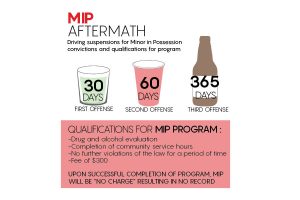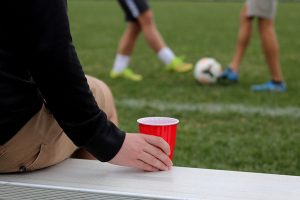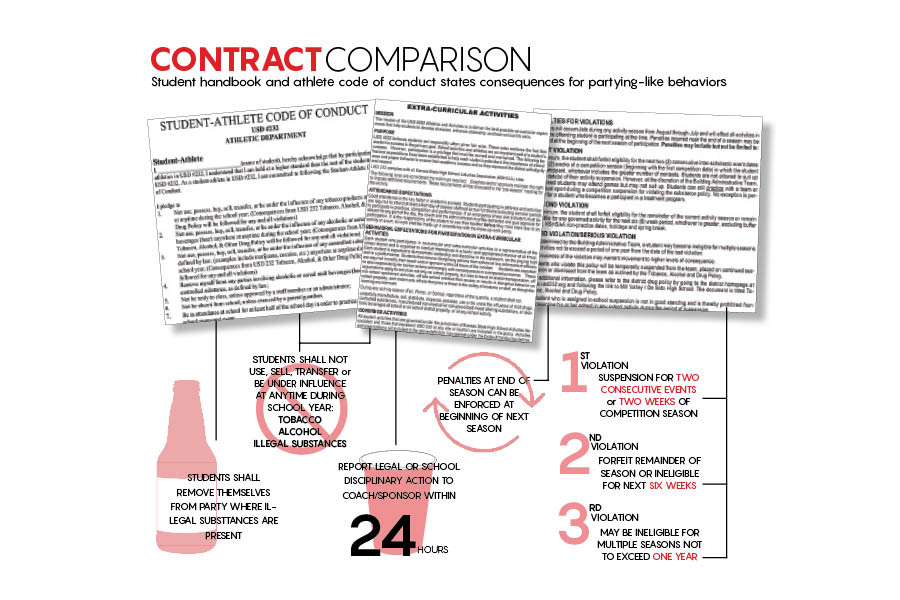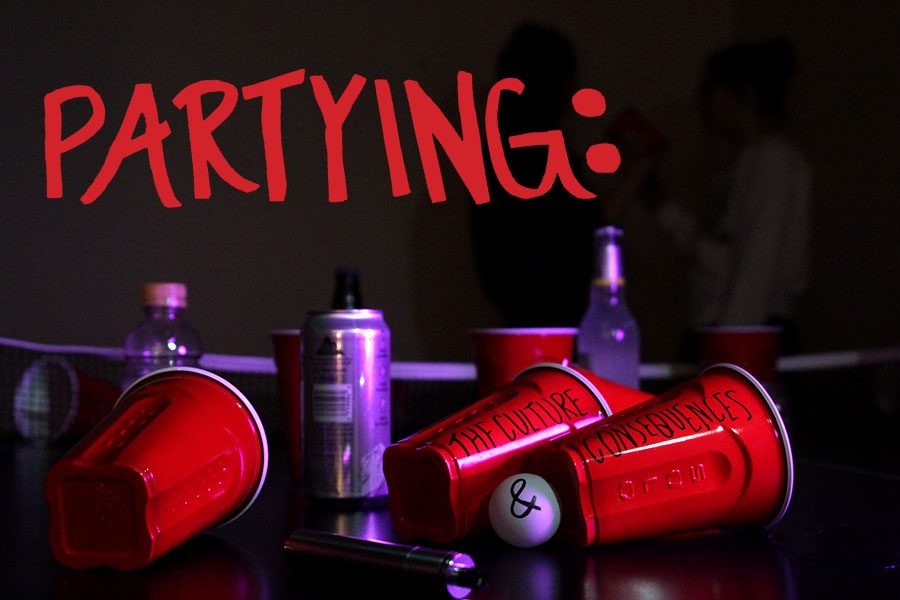By Annie Myers
Students face legal, extracurricular and social consequences from involvement in party culture.
Party culture: breaking down the negative repercussions that are often overlooked, forgotten or ignored
An in-depth investigation of the legal, extracurricular and social consequences of getting caught in the party scene
November 16, 2017
In elementary school, the counselor would visit your class and talk about drugs and alcohol. Back then, it was a foreign concept. You were eight years old, and the most alcohol you had ever seen was the wine at church or in your parents’ cabinet high up out of your reach. You didn’t even know what marijuana was, but it was hammered in you that drugs and alcohol were bad.
In middle school, things got a little more serious. You’d hear about your older sibling coming home far too late last night, or that one kid in your math class getting in trouble with cigarettes. “Pill Valley” became a common phrase in your vocabulary. Though you’d never admit it, you were naive as to what this had to do with you.
Now, in high school, you’re at a party, and you’re handed a red Solo cup filled with some sort of alcoholic substance. You think about how many Red Ribbon Weeks you’ve dressed up for, how many contracts you’ve signed pledging to be drug and alcohol free and how many people have told you throughout your life how dangerous it all supposedly is for you. You hesitate for a second, then drink.
So, what happens next? Whether you get in trouble or not, participating in the party culture can have consequences that extend beyond getting grounded. It’s important to investigate the possible circumstances so students are aware of what they’re getting themselves into.
There’s no denying that the topic is timely. Recent suspensions for student athletes and members of extracurricular activities have left a blurred line between activities on the weekend and consequences at school. In this special section, the consequences of party culture will be investigated further to include the school’s reputation and legal consequences.
Legality
As defined by law, any person under age 21 is not allowed to buy, sell or consume alcohol in any form. In Shawnee, any person under the age of 18 is not allowed to buy or sell tobacco or vaping products. Finally, any drug banned by the Drug Enforcement Agency is illegal for any person regardless of age, such as marijuana or cocaine.
Still, what actually happens when minors break these laws?
Chief of police Rob Moser said that minors “possessing, consuming, obtaining, purchasing, or attempting to purchase alcohol” will be used a charge of Minor in Possession. Some students are eligible for an MIP program, which along with a rigorous process, can dismiss the charge from their record. Schools can also request this information and establish additional consequences.
“Sometimes, school administration will learn of illegal activities by students through various avenues, even separate from law enforcement, and request the names of those participants,” Moser said. “State statute allows for the sharing of that information between law enforcement and the school district to help create the safest possible environment for the educational institution’s students and employees.
One sophomore girl who wishes to remain anonymous said she was pulled over in the middle of the night with some friends last summer and was charged with an MIP for possession of marijuana.
“I was put on diversion for a couple months,” the girl said. “The MIP is not off my record. It affected my relationship with my parents a lot. Once my parents lost trust in me, it took a while to gain it back.”
The school can only enforce consequences when the activities in question happen on school facilities or at school-sponsored events. This includes away games and in the parking lot, which is why tailgating has been prohibited this year. The student handbook defines illegal activities as using or selling drugs, drinking and being under the influence at school. The consequences follow a system of cumulative discipline, where the first offense can result in long term suspension and a second offense can result in “readmission to probationary status if the student agrees to drug and alcohol rehabilitation.” For a third and subsequent offense, the student can be expelled from school.
But most of the time, illegal activities don’t happen at school. They happen in basements and cars, usually at night, and it can be hard to find out exactly what happened. This is why the school does not take responsibility for students’ actions outside of school — it’s left up to law enforcement.
Extracurricular and sports teams
As for the school, school resource officer Maurice Loridon said only students involved in extracurricular activities such as sports or clubs will face the consequences from the administration for illegal activities in or out of school.
“I don’t want it to say if you’re not in a group, it’s OK,” Loridon said. “Either way, it’s wrong. But you’ll get consequences by the courts, but not at school. The reason kids get in trouble at school is because of those extracurricular activities that represent Mill Valley. I think the main point should be is that those extracurricular people and whatever group they’re in have those contracts [that says they’re not supposed to].”
The contract Loridon mentioned refers to the documents students are required to sign while participating in an extracurricular activity. The documents are written at the time of club founding and are usually written by sponsors and club leaders or adapted from a national organization. Not all extracurriculars require this, but they do offer more accountability for students who represent the school.
For athletics, the requirements differ. Before every season, each athlete is required to sign the district’s student athlete code of conduct, a guideline of seven rules that detail expectations for student athletes. These regulations only apply to athletics, not general extracurriculars. Four of these rules center around illegal substance use.
By signing the code of conduct, student athletes pledge to “remove [themselves] from any parties involving alcoholic or cereal malt beverages or any controlled substances, as defined by law,” and never possess, buy, sell, transfer and use — on and off campus.
Mid-October, five boys soccer players, according to head soccer coach Arlan Vomhof, attended a party that would eventually be shut down by the police. Word spread quickly about the consequence that followed: suspension from the team. The boys declined comment.

Student athletes face suspension from practices and games due to violation of code of conduct.
Athletic director Jerald VanRheen said even though students may not be drinking themselves, putting themselves in a party situation breaks the rules set forth by the code of conduct.
“If you’re at that party, and there’s people that are just drinking and having a good time, and you don’t leave, knowing that stuff is there, you’ve just violated the code of conduct,” VanRheen said. “You didn’t participate, but you were there. So in this code of conduct, [the district] asks that if you are there and you notice that kind of stuff is present, leave.”
Similar to sports teams, some extracurricular groups have their own standards include in their bylaws. Students can only be held accountable if the club has a set policy in place prior to an incident where the student has agreed not to participate in illegal activities, according to Loridon. In a survey of 12 clubs, seven have a contract already in place. However, all 12 said they would be in favor of a district-approved agreement outlining the expectations of their club members.
For example, NHS has national bylaws and a contract referring to dismissal, which were put into use after five NHS members were caught at a party after homecoming, according to NHS sponsor Jeff Wieland. Since the members had agreed to the organization contract, specifically the “dismissal” portion, they were dismissed from the organization.
Wieland explained that the students were given a conference, but that was only one part of a longer process involved in dismissal.
“They then have the opportunity to present information before a faculty council along with [a parent],” Wieland said. “That five-person faculty council is independent of us and they’re the ones who ultimately make the decision. Above that, the bylaws also provide the decision to appeal to the principal and the principal can override the decision of the faculty council.”

Though the consequences for both athletics and clubs are printed in black and white, some students, and even parents, don’t realize they exist.
“We’ve even learned that for some of those clubs, the kid and the parent sign it stating they understand the rules and if they break them they can be kicked off the team,” Loridon said. “Sometimes I don’t think parents realize when they’re signing them that there’s consequences.”
VanRheen clearly stated that he does not enjoy suspending students from school, but feels the responsibility to keep kids safe.
“Ultimately what we’re trying to do is to create a culture where kids don’t feel like they have to do that stuff and that they’re safe,” VanRheen said. “All that stuff, for high school students, is against the law. That’s the whole idea behind it.”
Reputation and relationships
According to Loridon, the reason students involved in extracurriculars are held at a high standard is because they represent the school. Administration does its best to keep the school’s reputation in a good light, but even athletic and scholastic accomplishments are overshadowed by the phrase “Pill Valley.”
Even before she started school, freshman Abigail Burke said some of her classmates told her she should go to DHS because of this nickname.
“I think [the school’s reputation is] affected [by this nickname] because we talk to our parents a lot and they hear us say ‘Pill Valley,’” Burke said. “And they kind of get a little skeptical and think about shipping their kids to De Soto.”
However seriously the nickname is taken with the community, Burke doesn’t “think [the drug use among students is] bad enough that we should be ‘Pill Valley,’” but doesn’t deny the fact students are using drugs.
Students who may not care about reputation still face consequences for their actions. English teacher Kristen Crosbie’s close relationship to her students has shown her how illegal activities outside of school affect students while they’re here.
“There’s consequences that are not legal, like not doing well in school,” Crosbie said. “Sometimes that culture leads you to hang out with people that you shouldn’t hang out with, and it changes your life for the worse that way because then it’s hard to get back where you were.”
A senior girl, anonymous for legal purposes, drinks alcohol about once a week and has said she enjoys vaping. The closest she’s been to facing the legal consequences was when the police came to a club she was at in Lawrence; even then, she said the police didn’t talk to her. Other than that, the biggest consequence she faced was when her mother found a beer can under her couch.
“For a month, I’d say, it was kind of awkward between my mom and I because she had a lot of trust in me, and then after that she thought I was lying all the time,” the girl said. “She didn’t really believe what I was saying.”
Even after graduation, the social repercussions of underage drinking and drug usage still take their toll. Crosbie has seen students who take drugs and alcohol more seriously than school, and a former student of hers who “went off the deep end” faced harsh consequences from her family.
“I guess she did have the support of her parents because it was kind of a tough love situation,” Crosbie said. “There were definitely drugs involved, and I guess she felt like she wasn’t supported because she was kicked out of the house. … She ended up in rehab, and I think she’s doing better now.”
Still, Crosbie emphasizes the importance of learning to take responsibility.
“I’ve watched kids get caught and not have to deal with the consequences because parents don’t want them to have to deal with the consequences for whatever reason,” Crosbie said. “Sometimes [the consequences are] not taken seriously because it hasn’t had to be taken seriously. I know that when you’re on your own, it’s a whole different ball game. You’re an adult, and you’re responsible. Might as well start being responsible now.”
